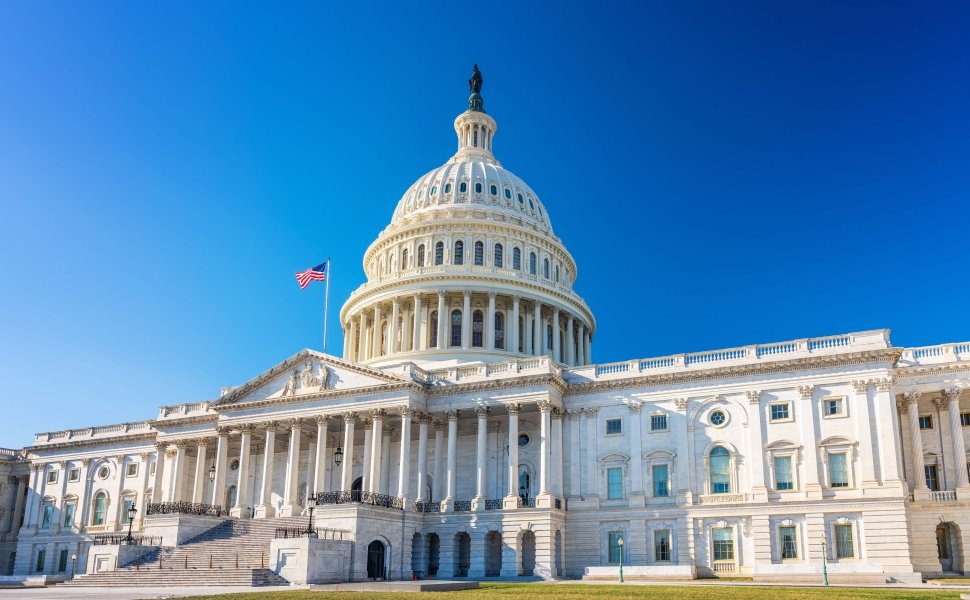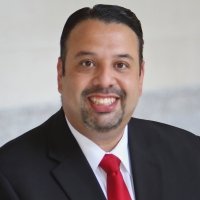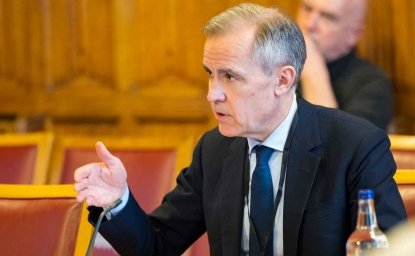This transcript has been lightly edited for clarity.
John Milewski: Welcome to the Need to Know podcast from the Wilson Center, a podcast for policymakers available to everyone. Always informative, nonpartisan and relevant. We go beyond the headlines to understand the trend lines in foreign policy.
Hello, I'm John Mileski Welcome back to another episode of Wilson Center's Need to Know podcast. We need to know with a tagline that says a podcast for policymakers available to everyone. Well, this episode is not just for policymakers. It's about policymakers. Since today, we're going to be taking a look at the year ahead for the US Congress. And our guest is someone who knows that institution well from both inside and out.
He is Eddy Acevedo and he is currently chief of staff and senior advisor to the president and CEO here at the Wilson Center. Ambassador Mark Green. Previously Eddy held senior management positions at the US Agency for International Development and served on the senior professional staff for the House Foreign Affairs Committee and as staff director for its subcommittee on Middle East and North Africa.
Eddy, welcome. Great having you here. Can't think of a better guest for this topic.
Eddy Acevedo: Thank you, John. Pleasure to be here.
JM: So foreign policy priorities are fairly obvious when it relates to the invasion of Ukraine and the war between Israel and Hamas in Gaza. But talk to us about what are some of the other priorities that Congress will be juggling during this year.
EA: So I think it comes down to two imminent priorities. The first one is obviously the appropriations to keep the government open. They have begun to do a little bit of a sliding scale when it comes to the different government agencies and the different dates of when it expires. That's coming right up in March. So just in a few weeks.
So that's going to be the first challenge that they have. We saw very much some positive progress on this effort last week. They were able to get the different subcommittees on Appropriations, was able to get their what's called their allocations. So the way the process works is that you first agree on a topline number for overall budget and then you agree to allocations for every subcommittee for their portions of that budget.
That just occurred last week. So it gives now the appropriators enough time to hopefully work together in a way to find some common ground, find some solutions, and be able to pass a budget for the remainder of the fiscal year. As you know, we've been operating under a continuing resolution up until March, when that expires. So hopefully that will that will occur and we'll get a budget and that will get us through the end of the fiscal year once.
So that is a priority number one priority. Number two is the what's called the supplemental, which is, as you stated, the funding that is going towards primarily Israel and the conflict in Gaza and also Ukraine in its unprovoked war from Russia against Ukraine. That's the second piece of legislation. So those are the two big ones that are coming up in the next few weeks.
JM: Give us a sense, you know, human beings have that challenge of walking and chewing gum at the same time, whether they're pedestrians or members of Congress. What is it like on the Hill to juggle major priorities that are competing for time and attention? And there's only 24 hours in a day?
EA: Yeah. You've hit it right on the head, John. I mean, this is this is something that's very difficult to pull off because you're looking at sort of many negotiations on many different fronts. This year, there was sort of an added component to these negotiations, which is some kind of an immigration deal. So that is something else that is in the works.
So it's a very intense part of the job. I've been there through these budget discussions and these supplemental requests. There's a lot of sort of question and answers that are going back and forth from the legislative to the executive branch, trying to get a little bit more clarity on the priorities, trying to get a little bit more answers on, hey, what is the plan if we give you X amount of money?
What's the plan on the execution side? So there's a lot of briefings that are going on, a lot of behind the scenes work that goes on when it comes to these things. But ultimately, you know, hopefully we get to a place that we can speak in one voice, one voice, meaning as one country where Republicans and Democrats, legislative and executive branch can come together to talk about the importance of US foreign policy, the importance of American leadership overseas.
And that is the end goal. You know, when I served on the House Foreign Affairs Committee, we used to say at the time that we were we very proud of the fact that we were one of the most bipartisan committee in Congress. That is something where both Republicans and Democrats would come together. And because we were looking at sort of US foreign policy interests around the world, we were able to get a lot done by working across the aisle.
JM: Ed, you mentioned immigration. We could start listing things like North Korea or Taiwan or other concerns around the globe. You know, when you get past the headlines of Ukraine and Gaza, what does is the bandwidth for Congress to turn attention to some of these other issues that are more in the chronic side versus the acute side? And should we expect any activity on the Hill related to these topics in the coming year?
EA: Absolutely. I hope so. I think you're beginning to see now the Select Committee on China. They're wrapping up some of their hearings. Both the House and Senate Foreign Relations Committee. They're wrapping up some of their oversight hearings. You know, this is a part of the conversation, John, that doesn't get enough attention. And what I mean by that is what I call the role of the US Congress in the US foreign policy.
A lot of times when it comes to foreign policy, there's so much attention and rightly so, that's given to, obviously, the power of the Oval Office, the secretary of state, the secretary of defense. Those all make sense, but we don't go a step further, which is the power of the US Congress, whether that is through appropriations to support our allies overseas, whether that is through different sanctions mechanisms, those authorities are provided by Congress most of the times, many times.
And as some are our adversaries overseas. And then, you know, back in the day, we used to do trade deals. All that went through the Hill, the nomination process, getting our ambassadors confirmed, getting many positions inside the state and USAID and other foreign policy instruments confirmed. I mean, that is that is sort of the back and forth process that happens.
And I think that the role that the Congress plays is vital, because ultimately, look, if you're the secretary of state, you're one person. I mean, yes, you have a large department, you have ambassadors. But, you know, for Secretary Blinken, you know, he cannot be in every single country. At the same time, members of Congress, a lot of them that have been there time and time again for many years, develop relationships with a lot of foreign leaders, develop relationships with their legislative counterparts overseas.
And that helps us tremendously. I would always tell folks, you know, many times, you know, presidents, secretaries, they come and go every two or three years maybe, or every four, eight years in the White House. Those will come and go. Some members of Congress have been there 15, 20, 30 years and in that time have developed their own relationships with different heads of states and different leaders around the world.
And I have seen that when the executive and the legislative branch work better together. Foreign common interests. It really is a beautiful sight, John.
JM: Look, let me ask you about the £800 gorilla. Right. We're in an election year. How does that alter our expectations for action from the US Congress? And, you know, you've been there during elections. How does it affect the people who are working on the Hill and trying to get things done?
EA: Sure. So, you know, the for Congress, there's always a bit of an imaginary time clock that exists that everybody knows that the closer you get to Election Day, you know, the more difficult things get. Because obviously many of the members of Congress who are who are running for reelection are going to be busy being in their districts. So there is a bit of a time clock to it.
And that's why every election cycle, you know, the leadership provides an ample amount of time for members of Congress to be back in their districts. District work periods is what is what they're called, so that they're able to do some of the campaigning. But ultimately, there's still the business of the country that needs to move forward. And for a lot of these members, again, especially the ones that have been there for a very long time, they understand and they know that, you know, they need to be able to juggle some of their current priorities while at the same time looking at what's going to happen on Election Day.
JM: Is it what can you tell your friends and colleagues who still are in the belly of the beast, who are still working on the Hill on a daily basis that looks different from the outside looking in things you wish you knew then that you know now?
EA: So to me, the biggest message I will say is there are more, there is more that binds us together than separates us. What I mean is for the American public, what they see in the press is a very much divided Congress, a Congress that cannot get anything done. However, when they do come together and when they do get stuff done, that's usually not covered in the press.
So while we understand that the situation on the Hill has become a little bit more polarizing in recent years, I can tell you that there's a lot of folks behind the scenes working together, both sides of the aisle, trying to find solutions for some of our nation's most complex issues. So I don't I don't lose hope in them.
I know that they're trying to do the right thing. And ultimately, that's what makes our democracy different. The many other countries around the world is being able to respect each side of the aisle with each other. And the fact that we can get some kind of solutions. You know, even until today, we have seen that the Congress can come together and come up with solutions.
JM: Eddy, I want to ask you about how things might look different from the outside looking in and what you could share with your friends and colleagues who are still on the Hill. Sort of what you wish you knew then that you know now when you're on the outside.
EA: Sure, John. So I think what I've learned a lot from being on the outside is that as I meet with many members of Congress and some of their staffers, regardless of political affiliation, there's more that binds many of these members together than there is that separates them. And I think that's part of the untold story of Congress.
A lot of times in the headlines you will hear about when Congress is dysfunctional, when Congress kind of get along, when Congress cannot get the work done. But then when they do, you don't hear those good news stories. You don't hear about some of the some of the bipartisan legislation that they are putting forward or that they're working on.
And I think that is an important message that we need to get out there into the American public that while many in Congress do have many differences, many are also working together in a bipartisan fashion. You know, one of the things that's never noticed on the Hill, John, is that you can have two members of Congress where on one particular issue, they can disagree.
But then there's other issues that they agree on. And they work together when they can agree and they obviously debate when they don't agree. And that's fine. That is a healthy democracy. That is something that we very much love and aspire to in this country, very different to some other democracies around the world. But being able to provide that platform so that everybody has an equal voice, everybody has their own opinions, and folks can bring that to the table in a peaceful manner, I think is something that should not be taken for granted.
JM: I'm going to ask you one final question, Eddy. And that's about, you know, the fuel that drives good decision making is good information. Right? And so where are the best sources? What are the best sources for Congress when they're trying to sort through a complex world?
EA: So, you know, when I was there, John, I tried to get as much as information from different sectors of our society. What I mean by that is I would lean on some think tanks around town who had some great experts who could help. I would lean on asking the same question to different parts of our government, whether it was the State Department or DOD or USAID, just to try to get a collection of different answers to see what were some of the some of the things that we needed to that we needed to be doing.
I also would I would talk to a lot of civil society leaders, you know, do diaspora organizations who are very much well-informed about things that are happening globally. And there's also the private sector. You know, one of the things that we cherish very much is the fact that, you know, we believe in economic prosperity, not only in the US, but also in many parts of the world, and talking about US businesses, about what is preventing you from investing in X, Y and Z country.
How can we be able to export some of these ideals, but also some of our materials into new markets? And I think being able to get information from different sources. Congress itself has their own little think tank called the Congressional Research Service. So they are asked their very great experts over there who help pull a lot of this information together.
So I think one of the things that we should be doing more of, John, is that nowadays people tend to get information from one source or get information from one entity, as opposed to trying to get information from many different sources, many different entities. Many of them may not even agree to each other, but at least it gives you an ability to understand where the other side is coming from.
And I think by doing that, it makes it a lot better, a lot easier to be able to negotiate. And ultimately, that's what this comes down to, comes out to negotiations, comes out to compromises that both sides can do for the betterment of the country.
JM: Well, your wisdom and insights on this speak to our better angels. So I hope people are listening both on and off the hill and speaking good information. Before we close, we want to share with our listeners and viewers a new feature, a feature from the Center created by the Wilson Center's president, Ambassador Mark Green. It's called Points of Clarity.
And that's just what it intends to deliver on important topics and issues. The episode we're going to show you involves former South Carolina Governor David Beasley speaking about humanitarian aid. So let's take a look.
Governor David Beasley: Well, putting the necessary steps in is critical for really two reasons so that the taxpayer knows that the money's going where it needs to go. And number two, because you never have enough money to feed all the people that are struggling. You want to maximize every dollar to reach the most people. Whether we use fingerprinting, I retina scan systems in place to make sure we maximize every single dollar.
JM: And you can find additional episodes of points of clarity at Wilson Center, along with all kinds of valuable content to help you sort through a world of complex challenges, which is exactly what we hope to do here. I need to know whenever we have a new episode and we'll be back with another soon. Until then, my thanks to Eddy Acevedo for joining us today.
And to all of you watching, I want to say thank you for your time and interest. We appreciate it.









